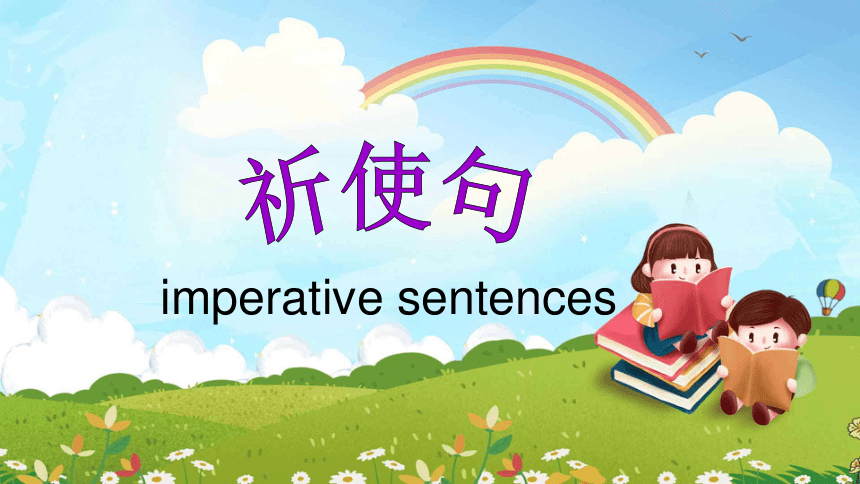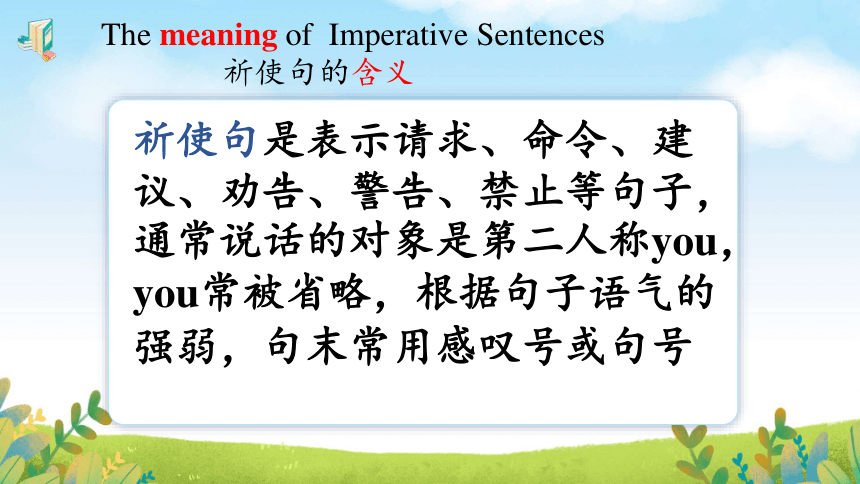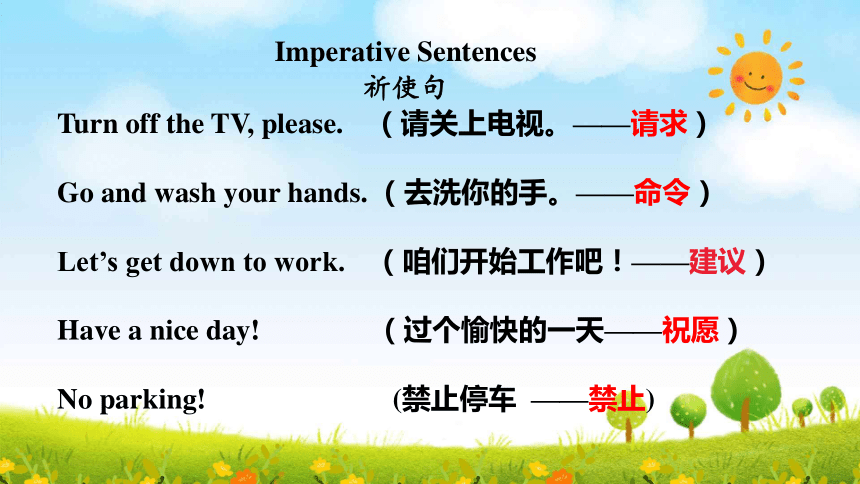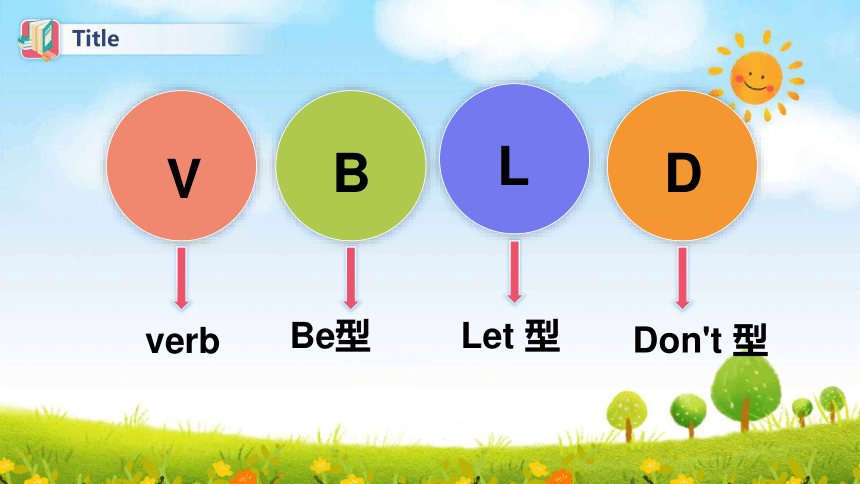祈使句用法(共8张PPT)
文档属性
| 名称 | 祈使句用法(共8张PPT) |  | |
| 格式 | pptx | ||
| 文件大小 | 1.3MB | ||
| 资源类型 | 教案 | ||
| 版本资源 | 人教新目标(Go for it)版 | ||
| 科目 | 英语 | ||
| 更新时间 | 2023-11-19 17:21:10 | ||
图片预览




文档简介
(共8张PPT)
祈使句
imperative sentences
The meaning of Imperative Sentences
祈使句的含义
祈使句是表示请求、命令、建议、劝告、警告、禁止等句子,通常说话的对象是第二人称you,you常被省略,根据句子语气的强弱,句末常用感叹号或句号
Turn off the TV, please. (请关上电视。——请求)
Go and wash your hands. (去洗你的手。——命令)
Let’s get down to work. (咱们开始工作吧!——建议)
Have a nice day! (过个愉快的一天——祝愿)
No parking! (禁止停车 ——禁止)
Imperative Sentences 祈使句
Title
V
B
L
D
verb
Be型
Let 型
Don't 型
一、祈使句的肯定句结构
(1) Do型:动词原形+宾语+其他. 如:
Open the door, please.
(2)Be型:Be+表语. 如:Be a good boy!/ Be happy!
(3) Let型:Let+宾语+动词原形+其他.
(或:Let’s+动词原形+其他.) 如:
Let me help you.
又如:Let’s play tennis.
2. 否定祈使句的常见句型结构:
① Do型和Be型的否定式:Don’t+动词
原形 / be+其他. 如:Don’t forget me.
又如:Don’t be late.
② Let型的否定式:Don’t+let+宾语+动词原形+其他. (或:Let’s+not+动词原形+其他.) 如:Don’t let him go back. 又如:Let’s not go swimming.
③ 警示语:No+名词 / 动词-ing形式. 如:
No talking.
祈使句用法口诀
Title
祈使句无主语,
主语you常省去。
动词原形谓语当,
句首Don't变否定。
朗读应当用降调,
句末常标感叹号。
Thank you!
Goodbye!
祈使句
imperative sentences
The meaning of Imperative Sentences
祈使句的含义
祈使句是表示请求、命令、建议、劝告、警告、禁止等句子,通常说话的对象是第二人称you,you常被省略,根据句子语气的强弱,句末常用感叹号或句号
Turn off the TV, please. (请关上电视。——请求)
Go and wash your hands. (去洗你的手。——命令)
Let’s get down to work. (咱们开始工作吧!——建议)
Have a nice day! (过个愉快的一天——祝愿)
No parking! (禁止停车 ——禁止)
Imperative Sentences 祈使句
Title
V
B
L
D
verb
Be型
Let 型
Don't 型
一、祈使句的肯定句结构
(1) Do型:动词原形+宾语+其他. 如:
Open the door, please.
(2)Be型:Be+表语. 如:Be a good boy!/ Be happy!
(3) Let型:Let+宾语+动词原形+其他.
(或:Let’s+动词原形+其他.) 如:
Let me help you.
又如:Let’s play tennis.
2. 否定祈使句的常见句型结构:
① Do型和Be型的否定式:Don’t+动词
原形 / be+其他. 如:Don’t forget me.
又如:Don’t be late.
② Let型的否定式:Don’t+let+宾语+动词原形+其他. (或:Let’s+not+动词原形+其他.) 如:Don’t let him go back. 又如:Let’s not go swimming.
③ 警示语:No+名词 / 动词-ing形式. 如:
No talking.
祈使句用法口诀
Title
祈使句无主语,
主语you常省去。
动词原形谓语当,
句首Don't变否定。
朗读应当用降调,
句末常标感叹号。
Thank you!
Goodbye!
同课章节目录
- Unit 1 Can you play the guitar?
- Section A
- Section B
- Unit 2 What time do you go to school?
- Section A
- Section B
- Unit 3 How do you get to school?
- Section A
- Section B
- Unit 4 Don't eat in class.
- Section A
- Section B
- Unit 5 Why do you like pandas?
- Section A
- Section B
- Unit 6 I'm watching TV.
- Section A
- Section B
- Review of Units 1-6
- Unit 7 It's raining!
- Section A
- Section B
- Unit 8 Is there a post office near here?
- Section A
- Section B
- Unit 9 What does he look like?
- Section A
- Section B
- Unit 10 I'd like some noodles.
- Section A
- Section B
- Unit 11 How was your school trip?
- Section A
- Section B
- Unit 12 What did you do last weekend?
- Section A
- Section B
